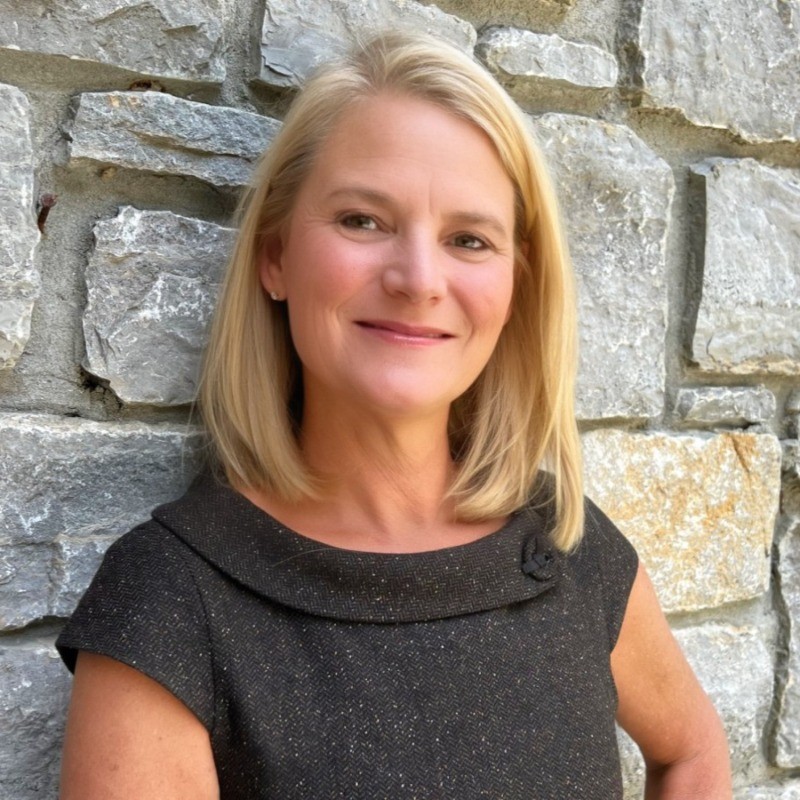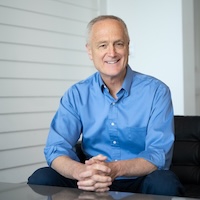After thirty-five years of working hard—first in finance and consulting, then education, then in faith-and-work focused ministry—I found myself bone-tired. Not just tired in the way a vacation solves. Tired in my bones, in my soul. And perhaps most concerning, tired in my ability to feel God’s presence clearly. To know His love rather than just cognitively grasp His love.
Ironically, I had been leading a global effort to help others discern God’s presence in their work while overworking myself into spiritual dullness. It wasn’t the result of an ethical failure or a massive misstep. Just slow drift. Subtle substitution. More “double-down try harder” rather than “be still” and “draw-near”. Long on hustle, light on dependence. I knew all the theology, and I had experienced the truth of the theology. But along the way, I preferenced my own effort over my relationship with God.
So, I stepped back for a season of recalibration. And then, without much of a plan, I commenced a 500-mile walking pilgrimage. My one hope? To experience the love of Christ again—not just know it, but feel it. Not just recall it, but be caught up in it.
Hour by Hour: The Return of Presence
On the pilgrimage, I encountered God in ways I can only describe as near-constant. Hour by hour, mile by mile, I sensed His presence not as an idea but as a Person. Through quiet paths, blistered feet, and open fields, the noise receded and I could hear again—though “hear” is too strong a word. It was more like an awareness, a nearness, a deep “knowing” that transcended words. It felt like a gentle canopy of love was with me most of my days, particularly on day three and days 20-27 of the 28 days of walking.
The voice of the Spirit was not loud, but steady and gentle. The message consistently felt like, “You are beloved because I made you, not because of what you do.” It was noticeably void of “shoulds,” although it did invite me to actionable things—to conversations with other people, to receive blessings in chapels, to offer prayers to those hurting, to make a spontaneous path detour which randomly led me to meet someone my son knows, and at one point even a clear, “stay here” regarding housing. Most of all, I felt a love that superseded all the decisions and frustrations that come along with hiking 500 miles.
I returned home expecting a “what an amazing journey” sense of accomplishment, but instead landed with a subtle grief. How could I live at that level of attentiveness in the frenetic pace of Western work? I had experienced spiritual mountaintops before—at camps, on retreats, in scheduled days of silence, hiking other trails, and even in a daily devotional time. But this was different. This was closer to constancy. And constancy, I feared, might be incompatible with inboxes, decks, and meetings.
But God did not leave me alone in the longing.
A Language for What I Was Seeking
At the suggestion of a wise and committed spiritual guide, I picked up Thomas R. Kelly’s A Testament of Devotion, a personal memoir of an ambitious professor’s deepening communion with Christ. One concept leapt from the page:
“But the Eternal Inward Light does not die when ecstasy dies, nor exists only intermittently, with the flickering of our psychic states. Continuously renewed immediacy, not receding memory of the Divine Touch, lies at the base of religious living. Let us explore together the secret of a deeper devotion, a more subterranean sanctuary of the soul, where the Light Within never fades, but burns, a perpetual Flame, where the wells of living water of divine revelation rise up continuously, day by day and hour by hour, steady and transfiguring.”
Kelly called it the life of “holy obedience,” a kind of interior posture of listening in motion. A way to hear more clearly. His words illuminated what I had tasted: constancy. And I was on a quest for more.
I needed help learning how to live that way again—this time in the real world, not just on a pilgrimage where walking, eating, and sleeping were my only goals for the day. That’s when I reached out to Tracy Mathews at Attune, a nonprofit dedicated to helping leaders learn to seek and listen to God’s guidance in the big and the small. She graciously guided me through some of their Ignatian-inspired listening exercises, many of which engage the imagination, and it became clear that I had spent much of my career limiting most of my spiritual listening to quiet times and overt prayer moments.
These exercises are ways of praying intentionally around clear issues with a posture of listening for God and then comparing what we sense is His Guidance to what we know from Scripture. This type of experience is more caught than taught, and while not totally new to me, I had rarely stopped to seek the voice of the Spirit in the middle of problem-solving. I would certainly pray about work: Lord, help us with this meeting. Give us wisdom. But what I had not done was pause to listen—to attune—in real time, with others, about the nitty-gritty of the work. Could I access the Holy Spirit in a meeting? Not a nudge. Or a guess. But perhaps a direct leading?
Bringing Listening Into Leadership
I began to use these structured attunement practices in many areas of my life and also experimented with new less structured rhythms including walking prayer and writing (overseen by a spiritual guide). And as my experiments led (and still lead) me towards new ways of being, I began to sense God’s voice more clearly and constantly on the nuances of work. Should I take this project? How should I price? How should I communicate this conflict? Should I hire that person? The discernment rhythms began to transform how I coach, facilitate, and consult.
And then suddenly, almost without planning, I began to pursue these exercises in groups. Would God bring clarity and unity in team decisions that require analysis? What if we collectively sense something that defies the analysis? These are the questions I began to explore. The exercises bring in both the analytical left-brain in the prayer process, as data does matter, as well as some right-brained creative elements to allow Him to speak beyond the numbers. And the more I leaned in, the stronger my listening muscles grew, the more easily I could detect His voice from my inner critic or all the other voices that rattle around in my brain. At this point I now facilitate nearly all my client teams and leaders not to just ask and thank God for His help on the strategic issue at hand, but also to make real space to listen together.
One nonprofit executive team I worked with recently practiced a collective spiritual attunement exercise around key themes in their strategic planning process. As each leader listened in silence and shared what they sensed, something remarkable happened: though none had coordinated beforehand, they each discerned a common invitation to a new way. They collectively determined that God was guiding them to dramatically shift their donor model—a move that felt costly, countercultural, and potentially existentially risky. The decision became clear—not because it was analytically the clear choice, but because a unified prompting in prayer created a collective conviction that brought clarity and peace. Courage emerged, not from certainty, but from Presence. One leader admitted, “I would never have had the bravery to make this choice on my own.”
The shift they made has borne fruit—but even if it hadn’t, the moment itself was formational. They had learned to hear together. And more importantly, they had been met by the tender encouragement of Jesus. God calls us to Himself as our primary call; all the things we do are our secondary calls. And yet He does care deeply about organizations.
The Beauty and the Risk
These kinds of practices—when done with reverence—bring immense beauty. I’ve seen leaders experience clarity, yes, but also peace, unity, and humility. Even when a decision remains foggy, something changes in the room when people make space to listen for the Spirit. It’s not about God being absent before. It’s about us finally slowing down enough to notice He’s always been near and believing He has things to reveal to us in our day-to-day work situations.
That said, I must offer a word of caution. Is this the equivalent of ChatGPT-ing God? Is there always quick clarity? An immediate answer? No. Constancy and clarity are not synonyms. Though He is always with us, He is not always hearable. Fog and drought do exist. And can we be sure we are hearing God and not our own agenda or inner critic?
I am sensitive to being a “cobbler with no shoes.” I am praying, ‘Lord, please let me not speak of you in this way or lead others in this practice if it is in fact not inculcated into my way of being.’ I am hesitant to even write this article due to the potential gaps in aspiration, enthusiasm and reality. While I do bring big and small decisions to God much more often than before, I still find that in my human frailty, I at times just forget His Presence and work from self-sufficiency. Or worse - willingly choose to avoid prayer due to a desire for expediency or control. This is an ongoing quest for me - one I have evangelized to others about - and I am far from perfection.
Further, these practices are powerful—and anything powerful can be misused. If handled carelessly or with ego, attempts to hear from God in workplace groups can lead to forms of spiritual manipulation. The risk of saying “God told me” without humility or for a particular outcome, perhaps even subconsciously, is real and damaging. I’ve seen it happen and may have done this myself. I tend to use the language “My best sense of God’s guidance” to allow for the reality that sometimes, we do not hear quite right. Additionally, there is always a step to discern if what we heard is aligned with the Scriptures and would over time lead to more Fruit of the Spirit.
So I hold these practices with an open hand, wanting to simultaneously encourage but with the reverence of His power and my frailty. I do not claim mystical mastery; I am no expert listener. Far from it. But I have tasted the goodness of God’s nearness. And it is changing how I work.
Still Learning, Still Listening
Looking back, I realize how varied my career has been: banking, consulting, education, nonprofit leadership, global ministry. All those chapters brought growth and grace—and also revealed how easily we can work for God without working with Him. It is the “with” that I have missed for many of my working hours, even in ministry.
Now, whether I’m coaching a leader, guiding a board retreat, facilitating an off-site, or leading a team in a strategic decision process, I try to begin with listening. Not just to the client. Not just to the data. But to the One who holds it all. And when invited, I try to bring the clients into the listening journey too. I don’t always hear clearly. Sometimes, I don’t hear at all. But most of the time, when I make room, I at least experience the Truth of His final statement before His ascension, “I will be with you always, until the end of time.”
This season of surrender is yet another twist on my Christian journey of sanctification. Another invitation to walk with the Spirit—not just on pilgrimage paths, but in team meetings, google calendars, and client decks. Am I still bone tired? Sometimes. But I am now more experientially clear, not just cognitively clear, about the source of my fuel and it is the presence of the Holy Spirit within.
My deepest prayer for you, dear reader, is not that you’ll adopt a set of tools. It’s that you’ll long again for the presence of God in your work. And that in that longing, you’ll find Him already there.
Missy Wallace is a facilitator, coach, and strategy consultant who partners with corporate and non-profit teams and leaders to assist with strategic decision making. She is passionate about building spiritual discernment into the process. Drawing from two decades of corporate and educational experience, plus a decade in formal ministry, she brings unique expertise in helping organizations discern God's guidance in their decision-making. She has worked extensively with leaders in the US, Latin America, and Southeast Asia, with some additional experience in the UK, Europe, and Africa.
Missy previously served as Managing Director of Global Strategic Services at Redeemer City to City (CTC) and Executive Director of CTC's Global Faith and Work Initiative. She is also the founder and former Executive Director of the Nashville Institute for Faith and Work.
Her corporate experience spans multiple sectors and countries, including strategy roles at The Boston Consulting Group, Time Warner, and Bank of America across offices in Charlotte, Chicago, New York, Singapore, and Bangkok. She also worked for a decade in education at a high school she helped establish.
In March 2025, Missy co-authored Faith and Work: Galvanizing Your Church for Everyday Impact. Her writing has appeared in several publications including Christianity Today, The Gospel Coalition and the Eventide Center for Faith and Investing. She is also a contributing author to The Missional Disciple: Pursuing Mercy & Justice at Work.
Missy holds a BA from Vanderbilt University and an MBA from Northwestern University's Kellogg School of Management. Additionally, she has her coaching certification from Brown University.
She is married to Paul Wallace, and together they enjoy hiking—from city streets to mountain trails—and spending time with their three grown children. She recently completed a transformative 500-mile walking pilgrimage, deepening her spiritual journey of abiding with Jesus, which she loves to discuss with anyone who will listen.
Lakelight Monthly
Curated resources, delivered on the last Saturday of the month.
By subscribing you agree to with our Privacy Policy and provide consent to receive updates from our company.














